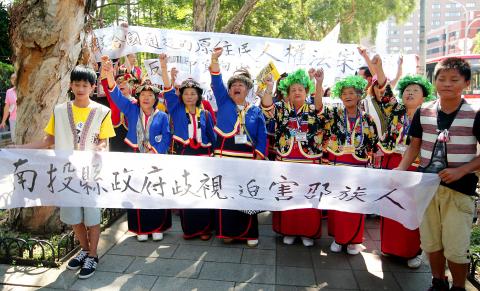Performing a traditional exorcism ritual, a group of Thao Aborigines yesterday protested against a build-operate-transfer (BOT) resort project near Sun Moon Lake on Thao traditional lands, for which the government gave initial approval without consulting them.
Sprinkling self-brewed alcohol into the sky with her fingers while reciting spells, an elderly Thao shaman performed the traditional ritual to drive away evil spirits in front of the Executive Yuan.
“The evil is in there,” she said, pointing at the Executive Yuan compound.

Photo: CNA
Following the shaman were dozens of Thao Aborigines in their traditional dress, holding banners accusing the government of exploiting the Thao and urging the government to return their traditional domains to them.
“Sun Moon Lake and the surrounding areas are traditional territories of the Thao, but now the government is introducing Chinese capital to build a resort without having consulted us as the Aboriginal Basic Act [原住民族基本法] requires,” Thao National Assembly Speaker Banu Bagamumu told reporters.
While the government promised that the resort would bring jobs to locals, Banu Bagamumu said that Chinese tour agencies always bring along their own business partners and “the project will not benefit us at all.”
He called on the Executive Yuan to nullify its initial approval for the project and suspend all BOT plans before a program to revive traditional Thao culture is in place.
Indigenous Peoples’ Action Coalition secretary-general Omi Wilang, an Atayal, said that currently, there are only a few thousand Thao left in the country, who are struggling to keep their tribe and their culture alive.
“What the government should do for an ethnic group that is in such a disadvantaged position is protect, not to accelerate its peril,” Omi Wilang said.
Democratic Progressive Party Legislator Tien Chiu-chin (田秋堇) said that besides assessing the impact of the development project on the environment, the government “should equally assess its impact on the Thao culture.”
The Sun Moon Lake National Scenic Area Administration Office and the Nantou County Government are planning to work with a developer to build a four-star resort hotel costing more than NT$2 billion (US$66 million) near the lake.
The project is financed by Hong Kong’s Bonds Group. If it goes ahead as planned, the resort will be completed and opened in 2017.
Thao Aborigines and their supporters are expected to protest in front of the Environmental Protection Administration in Taipei on Friday.

A Ministry of Foreign Affairs official yesterday said that a delegation that visited China for an APEC meeting did not receive any kind of treatment that downgraded Taiwan’s sovereignty. Department of International Organizations Director-General Jonathan Sun (孫儉元) said that he and a group of ministry officials visited Shenzhen, China, to attend the APEC Informal Senior Officials’ Meeting last month. The trip went “smoothly and safely” for all Taiwanese delegates, as the Chinese side arranged the trip in accordance with long-standing practices, Sun said at the ministry’s weekly briefing. The Taiwanese group did not encounter any political suppression, he said. Sun made the remarks when

PREPAREDNESS: Given the difficulty of importing ammunition during wartime, the Ministry of National Defense said it would prioritize ‘coproduction’ partnerships A newly formed unit of the Marine Corps tasked with land-based security operations has recently replaced its aging, domestically produced rifles with more advanced, US-made M4A1 rifles, a source said yesterday. The unnamed source familiar with the matter said the First Security Battalion of the Marine Corps’ Air Defense and Base Guard Group has replaced its older T65K2 rifles, which have been in service since the late 1980s, with the newly received M4A1s. The source did not say exactly when the upgrade took place or how many M4A1s were issued to the battalion. The confirmation came after Chinese-language media reported

The Taiwanese passport ranked 33rd in a global listing of passports by convenience this month, rising three places from last month’s ranking, but matching its position in January last year. The Henley Passport Index, an international ranking of passports by the number of designations its holder can travel to without a visa, showed that the Taiwan passport enables holders to travel to 139 countries and territories without a visa. Singapore’s passport was ranked the most powerful with visa-free access to 192 destinations out of 227, according to the index published on Tuesday by UK-based migration investment consultancy firm Henley and Partners. Japan’s and

BROAD AGREEMENT: The two are nearing a trade deal to reduce Taiwan’s tariff to 15% and a commitment for TSMC to build five more fabs, a ‘New York Times’ report said Taiwan and the US have reached a broad consensus on a trade deal, the Executive Yuan’s Office of Trade Negotiations said yesterday, after a report said that Washington is set to reduce Taiwan’s tariff rate to 15 percent. The New York Times on Monday reported that the two nations are nearing a trade deal to reduce Taiwan’s tariff rate to 15 percent and commit Taiwan Semiconductor Manufacturing Co (TSMC, 台積電) to building at least five more facilities in the US. “The agreement, which has been under negotiation for months, is being legally scrubbed and could be announced this month,” the paper said,